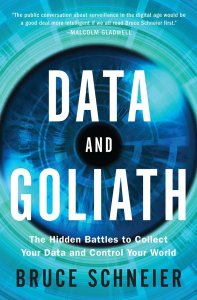
‘Data and Goliath’ A Portrait of Big Data Abuses

A new book by security expert Bruce Schneier is raising serious questions about the state of privacy in the big data age, and whether giving corporations and government access to the most intimate details of our lives in exchange for convenience and security is a tradeoff we should be making.
Since 9/11, Schneier has been an outspoken critic of the government’s sometimes ham-handed approach to security. Take the airport security checkpoints, for example. Is the economic loss from asking everybody to wait in line and take off their belts and shoes (more than $10 billion per year in 2004 dollars) or the added deaths from people deciding to drive instead of fly (500 per year) worth the marginal increase in security we get from the checkpoints? In Schneier’s analysis, they’re not.
In his latest book, “Data and Goliath,” Schneier is taking that same straightforward approach to addressing the rapid proliferation of the big data surveillance and analytics practices of government and corporate entities. For starters, you have to understand that they’re not separate.
“They’re intertwined; the two support each other,” Schneier writes in an excerpt from the book, which was officially released yesterday. “It’s a public-private surveillance partnership that spans the world. This isn’t a formal agreement; it’s more an alliance of interests. Although it isn’t absolute, it’s become a de facto reality, with many powerful stakeholders supporting its perpetuation.”
Surveillance data often moves back and forth between governments and corporations in a feedback loop. Copies of ID cards, pictures of closed-circuit television, copies of taxpayer data, pictures from license plate cameras, and cell phone location data is commonly packaged and shared, he says.
Corporations have a whole additional line of systems designed to track consumers. “Your online and in-store purchasing patterns are recorded, and reveal if you’re unemployed, sick, or pregnant,” reads the book description for “Data and Goliath.” “Your e-mails and texts expose your intimate and casual friends. Google knows what you’re thinking because it saves your private searches. Facebook can determine your sexual orientation without you ever mentioning it.”
But what can regular citizens do? According to Schneier, we’ve been complicit in this big data surveillance—from corporations because it promises us convenience and from the government because it promises us protection. “The result is a mass surveillance society of our own making. But have we given up more than we’ve gained?”































